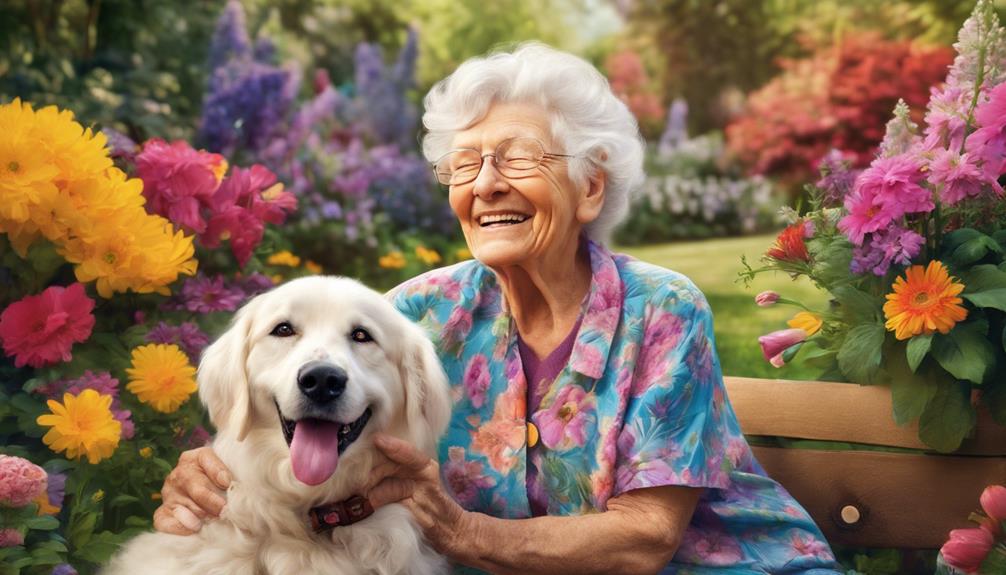Studying the advantages of animal-assisted therapy for senior citizens reveals that having a beloved pet nearby can offer significant comfort and joy in their golden years.
The profound impact that pets have on the well-being of seniors is akin to a soothing melody that lingers in the air, offering comfort and solace.
Whether it be in the form of wagging tails or gentle purrs, the presence of pets has a remarkable ability to uplift the spirits of the elderly.
Join us on this journey as we explore the transformative power of pet companionship for our beloved seniors.
Key Takeaways
- Emotional support and companionship from pets boost well-being for seniors.
- Pet therapy enhances cognitive function and memory in the elderly.
- Improved physical health and mobility through pet therapy for seniors.
- Overall benefits include emotional, cognitive, physical, and social well-being enhancements.
Emotional Benefits of Pet Therapy
How can pet therapy positively impact the emotional well-being of the elderly?
Pet therapy provides a special kind of companionship that goes beyond words. For the elderly, interacting with therapy animals brings a sense of security, comfort, and emotional support that's truly invaluable.
The bond formed in therapy sessions with these animals can help decrease feelings of loneliness and boost emotional well-being significantly. Seniors who engage in pet therapy often experience a decrease in stress levels and anxiety, leading to an overall improvement in their emotional state.
The presence of therapy animals can offer a source of joy and comfort during challenging times, fostering a sense of connection and understanding that's truly uplifting. Through the emotional benefits of pet therapy, the elderly can find solace, companionship, and a renewed sense of happiness that enriches their lives in profound ways.
Cognitive Enhancements Through Pet Companionship

Interacting with pets enhances cognitive function in seniors, improving memory and mental alertness. This interaction provides valuable mental stimulation and emotional well-being, contributing to positive cognitive enhancements in elderly individuals.
Here are three ways pet companionship can benefit seniors' cognitive function:
- Improved Memory: Regular interaction with pets has been linked to memory enhancement in seniors. The companionship and activities shared with pets can help seniors retain and recall information more effectively.
- Enhanced Problem-Solving Skills: Studies have indicated that seniors who engage with pets experience better cognitive performance, including improved problem-solving skills. The challenges and activities involved in caring for a pet can stimulate seniors' brains, enhancing their ability to solve problems.
- Brain Stimulation: The cognitive benefits of interacting with pets go beyond memory and problem-solving skills. The companionship of pets can stimulate seniors' brains, leading to increased cognitive abilities and emotional well-being. This brain stimulation can help seniors maintain mental acuity and cognitive function as they age.
Physical Well-being and Pet Therapy
Seniors engaging in pet therapy experience improved physical well-being through enhanced cardiovascular health, lower blood pressure, and better mobility. Pet therapy programs offer elderly individuals a unique avenue to engage in physical activity, which can have profound effects on their overall health.
Studies have shown that interacting with pets can reduce stress levels, leading to improved cardiovascular health and decreased risk of heart disease. The companionship provided by pets not only encourages seniors to be more active but also releases endorphins that promote a sense of well-being.
This sense of purpose and routine contributes to enhanced quality of life for seniors participating in pet therapy. By incorporating pet therapy into aged care settings, we can help improve health markers, reduce tension, and ultimately support the physical well-being of our elderly population, fostering a healthier and happier community.
Social Interaction Improvement With Pets

Pets in retirement communities serve as invaluable companions, fostering social interactions and enhancing overall well-being among residents.
Here are three ways in which pet ownership can improve social interaction for older adults:
- Conversation Starters: Pets often serve as excellent conversation starters, helping seniors connect with one another and form new friendships. Sharing stories about their furry friends can spark engaging discussions and create a sense of camaraderie within the community.
- Combatting Loneliness: The companionship provided by pets can help combat feelings of loneliness among older adults. Interacting with animals can provide emotional support and a sense of purpose, reducing isolation and increasing social engagement.
- Creating Community: Having pets in retirement communities can foster a sense of community among residents. Whether it's organizing pet-friendly activities or simply bonding over shared experiences as pet owners, pets play a vital role in bringing people together and enhancing the social fabric of the community.
Therapeutic Benefits of Pet Companions
Exploring the therapeutic benefits of pet companionship reveals a profound impact on the well-being of the elderly, encompassing physical, emotional, and psychological advantages. Interacting with therapy pets has been proven to improve immune function, lower blood pressure, and even reduce healthcare costs for seniors. The presence of pets can alleviate feelings of loneliness, foster increased social interaction, and motivate elderly individuals to engage in physical activities, promoting overall wellness. Furthermore, the release of calming neurotransmitters through pet therapy sessions can decrease the risk of heart disease and contribute to a longer, healthier life post-heart attack.
The psychological benefits of pet companionship are equally remarkable, with seniors experiencing reduced stress levels and anxiety when in the company of therapy animals. The profound connection between the elderly and their animal companions offers a sense of security and comfort during life's challenges, leading to a decrease in negative behaviors, particularly in patients with Alzheimer's. Embracing the therapeutic advantages of pet companionship not only enhances the quality of life for seniors but also provides a fulfilling and enriching experience for both the elderly individuals and their furry friends.
Frequently Asked Questions
Why Do Pets Help Older People Live Happier and Longer?
Pets help older people live happier and longer by providing companionship, reducing stress, and promoting physical activity.
The bond between seniors and pets enhances mental well-being, decreases loneliness, and fosters a sense of purpose.
Interacting with pets can lead to improved cognitive function and lower the risk of dementia.
Additionally, the unconditional love and affection from pets can positively impact emotional health, contributing to a higher quality of life for older individuals.
What Are the Benefits of Companionship With Animals?
Companionship with animals offers us unconditional love, purpose, and reduces loneliness. Interacting with pets provides emotional support, comfort, and joy. They become constant companions, especially during times of isolation.
Having animals around improves mental well-being and quality of life. The bond between us and animals promotes security, reduces stress, and offers comfort during life challenges.
What Are the Psychosocial Benefits of Animal Companionship?
We believe that the psychosocial benefits of animal companionship are truly remarkable. Pets provide seniors with a sense of security, emotional well-being, and comfort during life challenges.
Interacting with pets can reduce stress, anxiety, and negative behaviors, even in patients with Alzheimer's. The strong connection between pet companionship and reduced risk of depression in seniors highlights the calming presence of animals, leading to improved psychological and emotional health.
How Living With a Pet Can Increase Happiness?
Living with a pet can boost happiness in seniors by providing constant companionship and emotional support. Pets offer unconditional love and a sense of purpose, reducing feelings of loneliness and enhancing overall well-being.
Interacting with pets leads to joy and improved mental health, fostering contentment and fulfillment. The presence of pets in seniors' lives creates a sense of happiness, contributing to a higher quality of life and emotional well-being.
Conclusion
In conclusion, pet therapy for the elderly is like a ray of sunshine on a cloudy day, bringing warmth, comfort, and joy into their lives.
The bond between seniors and their furry companions is a treasure trove of love and healing, creating a tapestry of happiness and well-being.
Through the simple act of pet companionship, the elderly find solace, laughter, and a renewed sense of purpose, making their golden years truly golden.









